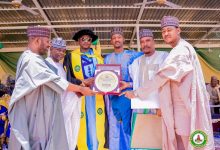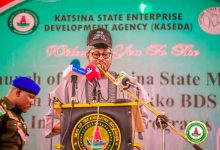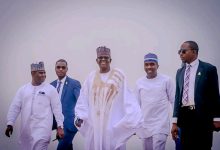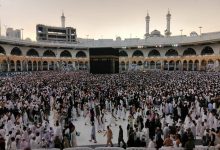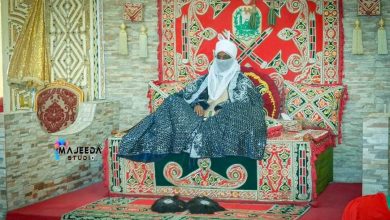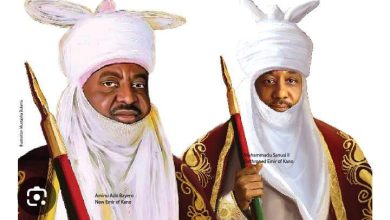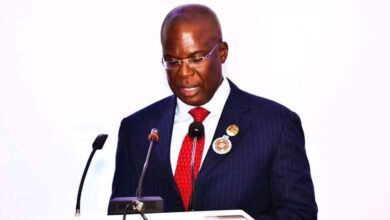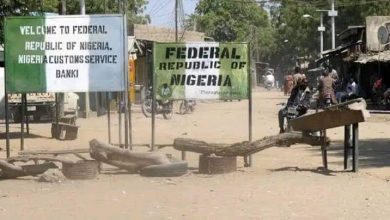Recent Development: Former Nigerian President Jonathan Meets Tinubu in Abuja
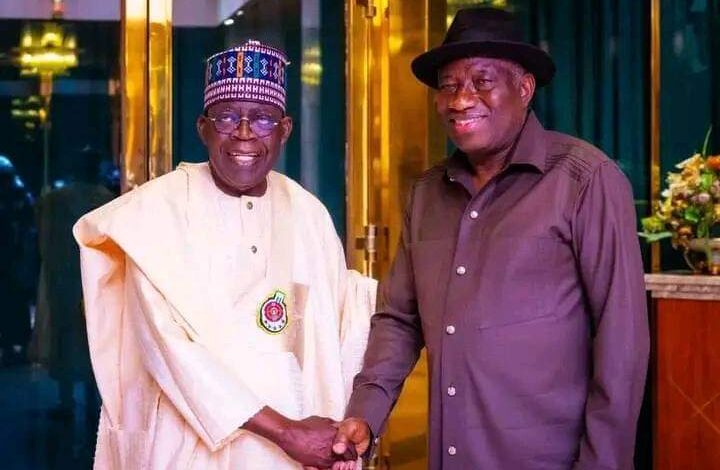
Recent Development: Former Nigerian President Jonathan Meets Tinubu in Abuja
The former President of Nigeria, Goodluck Jonathan, had a meeting with former Lagos State Governor, Bola Tinubu, in the capital city of Abuja on Friday, one week after the All Progressives Congress (APC) Convention confirmed Tinubu as the party’s presidential candidate for the February 2023 elections.
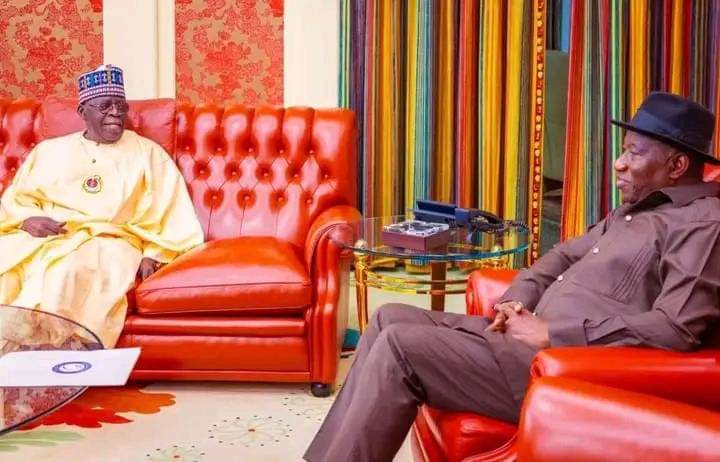
The political landscape in Nigeria is witnessing significant developments as former President Goodluck Jonathan and former Lagos State Governor Bola Tinubu recently crossed paths in Abuja. This meeting holds profound implications for the upcoming 2023 presidential elections, as it marks a notable engagement between two influential figures in Nigerian politics. In this blog post, we will delve into the details of this encounter and its potential ramifications for the political landscape.
The Meeting in Abuja:
On a Friday morning, Goodluck Jonathan, who served as the President of Nigeria from 2010 to 2015, met with Bola Tinubu, a prominent figure in Nigerian politics and the former Governor of Lagos State, in the capital city of Abuja. The meeting took place just a week after the All Progressives Congress (APC) Convention, where Bola Tinubu secured the party’s presidential ticket for the upcoming elections in February 2023.
Key Takeaways from the Meeting:
- Political Alliances: The meeting has raised speculation about possible political alliances and collaborations between the two leaders. Given their influence and respective support bases, any political move involving Jonathan and Tinubu could significantly impact the dynamics of the 2023 elections.
- Intriguing Scenarios: The Nigerian political landscape is rife with intriguing scenarios. While Tinubu secured the APC presidential ticket, Goodluck Jonathan remains a key figure in the People’s Democratic Party (PDP). Speculation about potential alliances, coalitions, or even a contest between the two figures adds an element of uncertainty to the upcoming elections.
- National Unity: Both Jonathan and Tinubu have emphasized the need for national unity and stability. Their meeting may signal a commitment to fostering a more unified and stable Nigeria, addressing the country’s challenges through a collaborative approach.
- Electoral Dynamics: The encounter also underscores the significance of Nigeria’s electoral dynamics. The 2023 presidential elections are poised to be highly competitive, with candidates and parties vying for the support of the Nigerian electorate. The political decisions made by leaders like Jonathan and Tinubu will play a crucial role in shaping the outcome.
The Meeting in Abuja: Key Takeaways and Implications
The Nigerian political landscape recently witnessed a significant event that has sparked discussions, speculations, and intrigue. The meeting in Abuja between two influential political figures, former President Goodluck Jonathan and former Lagos State Governor Bola Tinubu, has piqued the interest of Nigerians and political observers alike. In this blog post, we will delve into the details of the meeting, explore its key takeaways, and discuss its potential implications on the country’s political future.
Chapter 1: The Gathering of Titans
1.1. The Players Involved – A brief introduction to the meeting’s participants, Goodluck Jonathan and Bola Tinubu, and their respective political backgrounds.
1.2. The Timing – The significance of the meeting’s timing, occurring just one week after Tinubu’s confirmation as the APC presidential candidate for the 2023 elections.
Chapter 2: Speculations and Rumors
2.1. Alliance or Coalition? – The prevailing speculations regarding the nature of the meeting: Is it an alliance, a coalition, or merely a cordial exchange of ideas?
2.2. Potential Electoral Scenarios – Exploring the various electoral scenarios that could emerge from this meeting, including the potential contest between Jonathan and Tinubu.
Chapter 3: Commitment to National Unity
3.1. Shared Focus on Unity – The common emphasis placed by both leaders on the importance of national unity and stability in Nigeria.
3.2. Addressing National Challenges – How the meeting signals a commitment to addressing the country’s multifaceted challenges through collaboration and cooperation.
Chapter 4: The 2023 Electoral Dynamics
4.1. High-Stakes Elections – The significance of the 2023 presidential elections as a high-stakes political event that will shape Nigeria’s future.
4.2. Influence and Support – The influence and support bases of Goodluck Jonathan and Bola Tinubu and their potential impact on the electoral outcome.
Chapter 5: Shaping Nigeria’s Future
5.1. Political Narratives – How the meeting contributes to shaping the political narrative in Nigeria, adding a layer of complexity and intrigue to the electoral process.
5.2. National Development – The role that both leaders can play in influencing policies and national development, regardless of electoral outcomes.
Chapter 6: Final Thoughts
6.1. The Ongoing Saga – The ongoing nature of this political saga and the importance of staying informed about further developments.
6.2. Nigeria’s Destiny – The reminder that the destiny of Nigeria is inextricably linked to the actions and decisions of its political leaders, and the impact on the nation’s future.
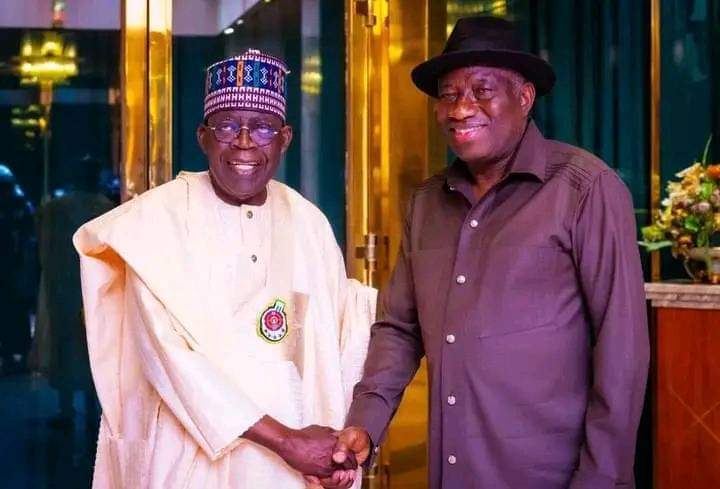
The Power Play of Politics: Understanding Political Alliances
Political alliances are the building blocks of modern politics. They shape governments, influence policies, and can drastically alter the political landscape. In this blog post, we’ll take a deep dive into the world of political alliances, exploring what they are, how they work, and the impact they have on the political process.
Chapter 1: Defining Political Alliances
1.1. What Are Political Alliances? – An introduction to the concept of political alliances and their role in the political arena.
1.2. Types of Political Alliances – An overview of the different forms of political alliances, including coalitions, partnerships, and alliances between political parties.
Chapter 2: The Motivations Behind Alliances
2.1. Shared Goals and Interests – How political parties and groups come together based on common goals and interests.
2.2. Electoral Strategy – The role of alliances in winning elections and gaining political power.
Chapter 3: The Mechanics of Building Alliances
3.1. Negotiation and Bargaining – An insight into the negotiation and bargaining processes involved in forming political alliances.
3.2. Policy Agreements – How political groups align their policies and ideologies to create a common platform.
Chapter 4: The Impact of Political Alliances
4.1. Electoral Impact – How alliances can sway election results and create strong electoral fronts.
4.2. Policy Influence – The role of alliances in shaping government policies and decision-making.
Chapter 5: Case Studies of Notable Alliances
5.1. International Alliances – Examining significant international political alliances, such as NATO and the European Union.
5.2. Domestic Alliances – Analyzing domestic political alliances, including coalition governments and bipartisan agreements.
Chapter 6: Challenges and Pitfalls of Alliances
6.1. Fragile Alliances – The risks of alliances breaking down due to disagreements or shifting priorities.
6.2. Public Perception – How political alliances can impact public perception and voter trust.
Chapter 7: The Role of Alliances in Contemporary Politics
7.1. Global Perspective – A look at the current state of political alliances on the global stage.
7.2. Recent Developments – How alliances have influenced recent elections and political changes.

Chapter 8: The Future of Political Alliances
8.1. Evolving Alliances – Predictions for how political alliances may evolve in the coming years.
8.2. The Shaping of Political Landscapes – How alliances will continue to play a pivotal role in shaping political landscapes.
Chapter 9: Final Thoughts
9.1. A Dynamic Political Tool – A summary of the dynamic and ever-changing nature of political alliances.
9.2. The Voter’s Role – The importance of informed voting and an understanding of the political alliances in play.
Conclusion:
The meeting between former President Goodluck Jonathan and former Lagos State Governor Bola Tinubu in Abuja is a significant development in Nigerian politics. As the 2023 presidential elections draw near, all eyes are on these influential leaders and the potential implications of their decisions and alliances. The political landscape in Nigeria is in a state of flux, and the actions of key figures will undoubtedly impact the future of the nation. Stay tuned for further updates on this unfolding political narrative.
